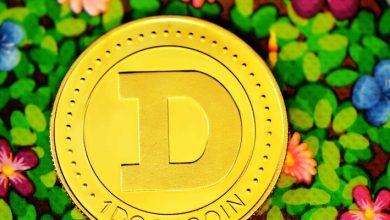DeFi Trends to Watch: What’s Next for the Industry

- The Rise of Decentralized Finance (DeFi)
- Key Players in the DeFi Ecosystem
- Emerging DeFi Technologies and Innovations
- Challenges Facing the DeFi Industry
- Regulatory Developments Impacting DeFi
- The Future of DeFi: Opportunities and Risks
The Rise of Decentralized Finance (DeFi)
The rise of decentralized finance (DeFi) has been one of the most significant trends in the cryptocurrency industry in recent years. DeFi refers to a system where financial services are built on blockchain technology, allowing for trustless and transparent transactions without the need for traditional intermediaries like banks.
One of the key factors driving the growth of DeFi is the concept of decentralized autonomous organizations (DAOs). These are organizations that operate without centralized control, using smart contracts to automate decision-making processes. This allows for greater efficiency, transparency, and security in financial transactions.
Another important aspect of DeFi is the concept of decentralized exchanges (DEXs). These platforms allow users to trade cryptocurrencies directly with one another, without the need for a centralized exchange. This reduces the risk of hacks and provides users with more control over their assets.
As DeFi continues to evolve, we can expect to see an increase in the number of innovative projects and applications being built on blockchain technology. This could include new lending and borrowing platforms, prediction markets, and even decentralized insurance services. The potential for DeFi to disrupt traditional financial systems is immense, and it will be fascinating to see how the industry develops in the coming years.
Key Players in the DeFi Ecosystem
Some of the key players in the decentralized finance (DeFi) ecosystem include various protocols, platforms, and projects that have been driving innovation and growth in the industry. These players are essential for the development and adoption of DeFi solutions, offering a wide range of services and products to users around the world.
One prominent player in the DeFi space is MakerDAO, which operates the Maker protocol and issues the stablecoin DAI. The Maker protocol allows users to generate DAI by locking up collateral assets, enabling decentralized lending and borrowing. Another important player is Compound, a decentralized lending platform that allows users to earn interest on their crypto assets by supplying them to the protocol.
Uniswap is a key player in the DeFi ecosystem, providing a decentralized exchange where users can swap various tokens without the need for an intermediary. Yearn Finance is another significant player, offering yield farming strategies and automated portfolio management through its various products. Aave is a popular DeFi protocol that enables users to lend, borrow, and earn interest on their crypto assets.
Overall, these key players in the DeFi ecosystem are driving innovation and shaping the future of finance by providing decentralized solutions for users to access financial services in a permissionless and trustless manner. As the industry continues to evolve, it will be crucial to keep an eye on these players and their contributions to the DeFi space.
Emerging DeFi Technologies and Innovations
As the DeFi industry continues to evolve rapidly, we are seeing a wave of emerging technologies and innovations that are reshaping the landscape. These advancements are driving new possibilities for decentralized finance, offering users more options and flexibility in managing their assets.
One of the most exciting trends to watch is the rise of decentralized exchanges (DEXs), which allow users to trade cryptocurrencies directly with one another without the need for a centralized intermediary. This peer-to-peer trading model is gaining popularity for its security, transparency, and censorship resistance.
Another key development in the DeFi space is the advent of synthetic assets, which are tokenized representations of real-world assets like stocks, commodities, and fiat currencies. By leveraging blockchain technology and smart contracts, users can gain exposure to traditional assets in a decentralized manner, opening up new investment opportunities.
Furthermore, we are seeing the emergence of decentralized lending and borrowing platforms that enable users to access liquidity without relying on traditional financial institutions. These platforms use smart contracts to automate the lending process, reducing the need for intermediaries and offering competitive interest rates to both borrowers and lenders.
Overall, the future of DeFi is bright, with a wealth of innovative technologies and solutions on the horizon. By staying informed and keeping an eye on these emerging trends, investors and users can position themselves to take advantage of the growing opportunities in the decentralized finance space.
Challenges Facing the DeFi Industry
There are several challenges facing the decentralized finance (DeFi) industry that are worth noting. One of the major obstacles is the issue of security, as DeFi platforms are vulnerable to hacks and smart contract bugs. This poses a significant risk to users’ funds and the overall credibility of the industry. Additionally, scalability is a concern as the current infrastructure may not be able to handle the increasing demand and transaction volume.
Regulatory uncertainty is another challenge that the DeFi industry is grappling with. As governments around the world begin to take notice of DeFi and its potential impact on traditional finance, there is a looming threat of regulatory crackdowns. This could stifle innovation and adoption in the industry, creating a barrier to growth.
Moreover, interoperability among different DeFi platforms is a key challenge that needs to be addressed. Currently, there is a lack of seamless integration between various protocols, which limits the efficiency and usability of DeFi applications. Standardization and collaboration efforts are needed to overcome this hurdle and unlock the full potential of DeFi.
Regulatory Developments Impacting DeFi
The rising popularity of DeFi has caught the attention of regulators worldwide, leading to increased scrutiny and regulatory developments impacting the industry. As governments and regulatory bodies seek to understand and regulate the decentralized finance space, DeFi projects and users must stay informed and adapt to changing regulations.
Regulatory developments impacting DeFi can have a significant impact on the industry, affecting everything from compliance requirements to the overall viability of projects. It is essential for DeFi projects to proactively engage with regulators, stay abreast of changing regulations, and ensure compliance to avoid potential legal issues.
One key regulatory development impacting DeFi is the focus on anti-money laundering (AML) and know your customer (KYC) regulations. Regulators are increasingly looking to apply these regulations to DeFi projects to prevent illicit activities such as money laundering and terrorist financing. DeFi projects must implement robust AML/KYC measures to mitigate regulatory risks.
Another regulatory development impacting DeFi is the potential classification of certain DeFi tokens as securities. Regulators are closely monitoring token sales and trading activities in the DeFi space to determine whether they fall under existing securities regulations. DeFi projects must carefully consider the legal implications of their token offerings and trading activities to avoid regulatory enforcement actions.
Overall, regulatory developments impacting DeFi highlight the need for the industry to mature and establish best practices for compliance. By staying informed, engaging with regulators, and implementing robust compliance measures, DeFi projects can navigate regulatory challenges and contribute to the long-term sustainability of the industry.
The Future of DeFi: Opportunities and Risks
Looking ahead, the future of decentralized finance (DeFi) holds both promising opportunities and potential risks. As the industry continues to grow and evolve, it is essential for participants to stay informed and vigilant.
One of the key opportunities in the future of DeFi is the potential for increased financial inclusion. By leveraging blockchain technology, DeFi platforms have the ability to provide access to financial services for individuals who are underserved or excluded by traditional banking systems.
Additionally, the future of DeFi also presents opportunities for innovation and experimentation. With the development of new protocols and applications, there is the potential to create more efficient and transparent financial systems that can benefit a wide range of users.
However, along with these opportunities come risks that must be carefully considered. Security vulnerabilities, regulatory challenges, and potential market manipulation are all factors that could impact the future of DeFi. It is crucial for participants in the industry to prioritize security measures and compliance efforts to mitigate these risks.
Overall, the future of DeFi is full of potential, but it is essential for stakeholders to approach it with caution and foresight. By staying informed, proactive, and adaptable, participants can help shape a future for decentralized finance that is both innovative and sustainable.



